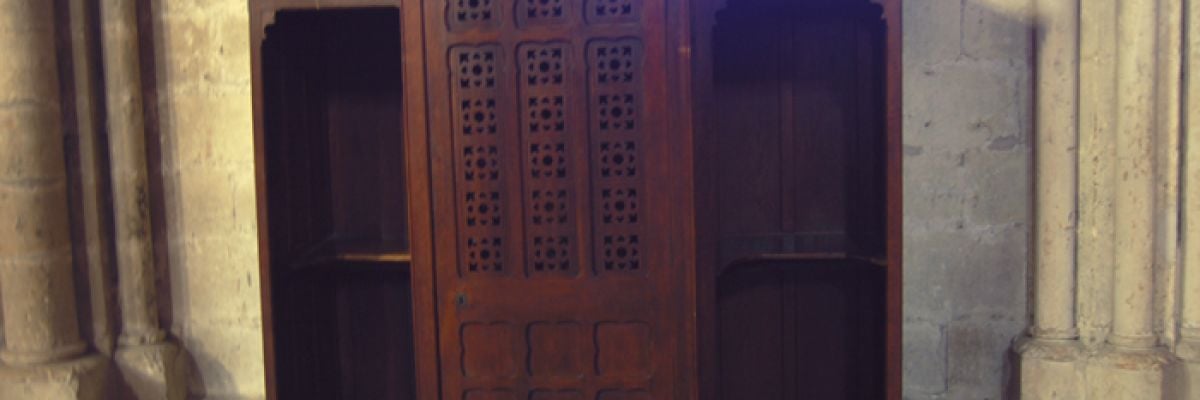
According to the Catholic News Agency a priest in Louisiana may be forced to reveal what was said during a confession when he testifies in an upcoming civil suit. The article says,
In May, the state Supreme Court ruled that the priest in question, Fr. Jeff Bayhi, may be subject to mandatory reporting laws regarding sexual abuse, and cannot invoke the privilege of confidentiality regarding an alleged confession made to him about sexual abuse by a young girl.
The diocese explained that a priest is under the gravest of obligations not to reveal the contents of a confession or if the confession even took place. He cannot do so even under threat of imprisonment or civil penalty, and incurs automatic excommunication if he breaks the “seal of confession.”
I’m not going to comment on the specifics involved in the case with Fr. Bayhi because, frankly, doing so would be irresponsible. Most stories covering this case take advantage of the fact that both dead men and priests who hear confessions can’t defend themselves. Instead, of focusing on what Fr. Bayhi allegedly said in the confessional, I’d like to focus on a broader issue. Namely, when a priest learns about child abuse in the confessional, either from a victim or a perpetrator, should he be legally compelled to report that abuse to the authorities? Should he be compelled to testify about what he heard in the confessional in a courtroom?
Debating the Seal of Confession
For most Catholics the issue is cut and dry, summarized pithily in the Catholic code of canon law – “The sacramental seal is inviolable; therefore it is absolutely forbidden for a confessor to betray in any way a penitent in words or in any manner and for any reason.” (Canon Law # 983. §1)
But among secular observers it’s not so clear. They say that, yes, communication between clerics and penitents is privileged, but so is communication between doctors and patients. However, in most states the law mandates doctors to report any suspicion of child abuse. This also applies to other professionals like teachers, therapists, and law enforcement. Should priests be treated differently than everyone else just because of their religious views?
Now, it’s certainly true that we should act in any reasonable way to protect children from child abuse, but we can think of many things the government should not do even when it comes to the lofty goal of protecting children from abuse. For example, the government should not secretly make audio recordings in our homes even if the goal were to protect children from abuse because losing the good of privacy outweighs any possible good that could come from such a tactic (not to mention it being an affront to the rights we have under the fourth amendment).
Even if doctors and teachers are required to report child abuse, there may be some groups who should not be required to report it because the harms of requiring them to report would be too great and certain fundamental rights would be violated as a result. I can think of one group this would apply to besides priests, which shows that such an exemption is not unfair or unheard of — defense attorneys.
Will the Defense Rise?
As far as I know, no state requires a defense attorney to report suspected child abuse if he learns about such abuse from his client. Of the nearly 50 kinds of people required to report suspected abuse in California, none of them are defense attorneys. One 2006 article from the New Mexico Law Review even says such mandatory reporting would hurt domestic violence vcitims.
Of course, an attorney is free to stop working with a client he suspects may have abused a child, but he can’t divulge what the client told him about the past crime to anyone else. This is part of a confidentiality privilege that has existed for a long time in the law called attorney-client privilege. According to Geoffrey C. Hazard,
The attorney-client privilege may well be the pivotal element of the modern American lawyer’s professional functions. It is considered indispensable to the lawyer’s function as advocate on the theory that the advocate can adequately prepare a case only if the client is free to disclose everything, bad as well as good. The privilege is also considered necessary to the lawyers function as confidential counselor in law on the similar theory that the legal counselor can properly advise the client what to do only if the client is free to make full disclosure.
Now, there are exceptions to attorney-client privilege. One exception includes communication that involves both the client and attorney planning to commit a crime together, such as plans to destroy evidence or to “cover up” a past crime. Another exception would be if the client says he plans to commit a future crime that will cause serious harm, which; in that case, the attorney must then report to the authorities.
But in general, communication about a past crime to an attorney is privileged and must remain confidential — but why? Isn’t reporting child abuse more important than helping criminals and their “sleazy” defense attorneys?
Stopping abuse is important, but it’s not worth overturning one of the fundamental components of our justice system. It’s not worth losing the role of an advocate who will provide someone accused of a crime, be he guilty or innocent, the best possible defense in a court of law.
So how does this relate to priests being forced to divulge what they learn in confession?
Rights of the Accused and the Damned
Just as forcing defense attorneys to report suspected child abuse would have the chilling effect of discouraging those accused of abuse from seeking legal counsel that can help them stay out of jail, forcing priests to report suspected child abuse that they learn about through the confessional will have the chilling effect of discouraging those who have committed those crimes from seeking absolution that can help them stay out of Hell.
While it’s important to stop child abuse, we can’t accomplish that goal through the deprivation of our fundamental rights (such as government surveillance of our homes that I mentioned earlier which would violate our right to privacy). For Catholics, this includes the right to see a priest and through him have God forgive us of our sins. While the seal of confession is inviolable in a way attorney-client privilege is not (since it allows for no exceptions), this makes sense because the stakes are infinitely higher.
Confession exists so that anyone, if he genuinely repents, can be forgiven of his sins no matter how heinous they may be. If the Church is accused of hiding abusers because of this narrow confidentiality privilege, then we can say that law firms are guilty of hiding abusers when they don’t turn in every client suspected of past abuse who confides in an attorney.
As Catholics, we aren’t asking for a sweeping exemption so that everything ever said to a priest is “off the record.” We are just asking for, oh, I don’t know, a wall of separation between Church and State. Specifically, a wall made up of the dark enamel of the confessional that lets us make “personal decisions” between ourselves, our priest, and our God without government interference.
If a man can be granted secrecy with his legal counsel so that he can protect his freedom, then that same man should be granted secrecy with his religious counsel so that he can protect his very soul.



